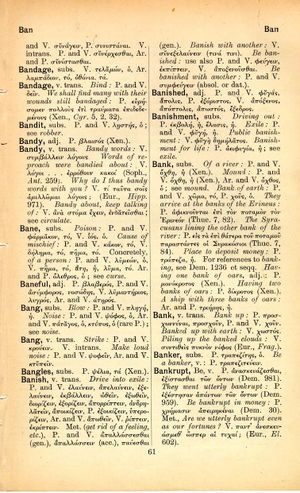bank
Χριστὸς ἀνέστη ἐκ νεκρῶν, θανάτῳ θάνατον πατήσας, καὶ τοῖς ἐν τοῖς μνήμασι, ζωὴν χαρισάμενος → Christ is risen from the dead, trampling down death by death, and upon those in the tombs bestowing life
English > Greek (Woodhouse)
subs.
Of a river: P. and V. ὄχθη, ἡ (Xen.).
Mound: P. and V. ὄχθη, ἡ (Xen.), Ar. and V. ὄχθος, ὁ; see mound.
Bank of earth: P. and V. χῶμα, τό, P. χοῦς, ὁ.
They arrive at the banks of the Erineus: P. ἀφικνοῦνται ἐπὶ τὸν ποταμὸν τὸν Ἐρινεόν (Thuc. 7, 82).
The Syracusans lining the other bank of the river: P. εἰς τὰ ἐπὶ θάτερα τοῦ ποταμοῦ παραστάντες οἱ Συρακόσιοι (Thuc. 7, 84).
Place to deposit money: P. τράπεζα, ἡ. For references to banking, see Dem. 1236 et seqq.
Having one bank of oars, adj.: P. μονόκροτος (Xen.).
Having two banks of oars: P. δίκροτος (Xen.).
A ship with three banks of oars: Ar. and P. τριήρης, ἡ.
v. trans.
Bank up: P. προσχωννύναι, προσχοῦν, P. and V. χοῦν.
Banked up with earth: V. χωστός.
Piling up the banked clouds: V. συντιθεὶς πυκνὸν νέφος (Eur., Frag.).

